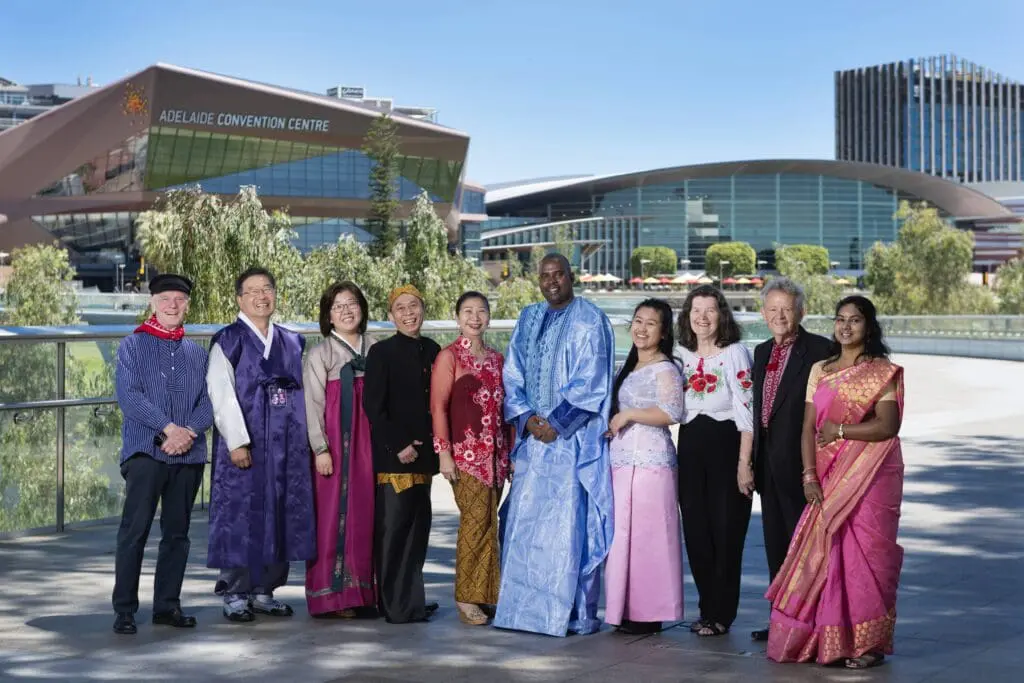Our History
A Journey of Trust and Respect

Multicultural Communities Council of South Australia (MCCSA) has proudly served South Australia’s diverse communities for 50 years, guided by over 75 years of tradition.
Our story mirrors Australia’s evolving multiculturalism, reflecting the changing needs of our society.
1949
Good Neighbour Council: Pioneering Post-War Migrant Support
The Good Neighbour Council (GNC), the first of its kind in Australia, was established in South Australia to help migrants and refugees settle after the Second World War. Its approach encouraged assimilation into Australian life. New arrivals were expected to adapt to all aspects of Australian culture, both publicly and privately. While this approach is no longer considered culturally appropriate, it marked the beginning of organised migrant support in the state.
1970s
From Assimilation to Integration: Shifting Attitudes to Embrace Diversity
The end of the ‘White Australia Policy’ brought greater diversity to Australia, with an influx of migrants from various backgrounds. This change called for a more open-minded approach to settlement. The focus shifted from assimilation to integration, allowing migrants to maintain their cultural traditions while becoming part of Australian society. This more flexible attitude encouraged cultural preservation, as long as practices did not conflict with Australian law.
1975
Ethnic Communities Council: Expanded Services and Advocacy
The Ethnic Communities Council (ECC) of South Australia formed to address the needs of Australia’s increasingly diverse migrant population. Building on the Good Neighbour Council’s (GNC) foundation, the ECC continued to assist new arrivals in settling into their new home. The ECC also added advocacy powers to its vital work, giving migrant communities a stronger voice. Meanwhile, the GNC continued to operate in a reduced capacity until 1989.
1980
United Ethnic Communities: A Period of Dual Representation
Due to differing views, the United Ethnic Communities of South Australia was established. For 15 years, these two councils worked separately to support migrant communities.
1995
Birth of MCCSA: Uniting for Stronger Support
In August 1995, the Ethnic Communities Council of SA and United Ethnic Communities of SA merged to create what we now proudly know as Multicultural Communities Council of South Australia (MCCSA). This landmark merger formed a unified body that would carry forward the vital work of its predecessors, marking the beginning of a new era in migrant community support.
MCCSA initially operated from Gawler Place before establishing its long-term home at 113 Gilbert Street in Adelaide CBD, where it continues to serve the community today.
MCCSA Today
A Growing and Adaptive Organisation
MCCSA has grown significantly, now representing over 130 multicultural organisations. For more than 20 years, our Gilbert Street office has provided a stable presence for our communities.
We run numerous programs addressing specific community needs, often in areas where the government recognises a community organisation can be more effective. Our work balances practical support with advocacy, ensuring the government understands the evolving needs of both recent arrivals and long-established migrant communities, including our ageing members.
Into the Future
Our Ongoing Commitment to Serve and Evolve
Looking ahead, MCCSA remains dedicated to supporting all multicultural communities in South Australia. We understand that recent migrants often have different needs compared to previous generations.
Our role as a voice for immigrant communities remains crucial. We continue to be a vital link between multicultural communities and government, reflecting and communicating changing needs. Where necessary, we develop services to meet these needs, contributing to the wellbeing of immigrants and Australian society as a whole.
MCCSA strives to be a steady friend and support for all multicultural communities. With 50 years of direct service and a 75-year inherited tradition, we remain committed to building successful communities in our diverse state and nation.